| | | | | | | Presented By Babbel | | | | Axios World | | By Dave Lawler · Dec 19, 2022 | | This is the 450th edition of Axios World, and the final edition of 2022. We'll be back in a couple weeks. I hope you have a wonderful and restful holiday period. - Tonight (1,811 words, 7 minutes), we start with a look ahead at the big elections looming in 2023.
Heads up: Axios will be at the 2023 World Economic Forum in Davos. If you'll be there, request an invite for our events. | | | | | | 1 big thing: 5 big elections of 2023 | 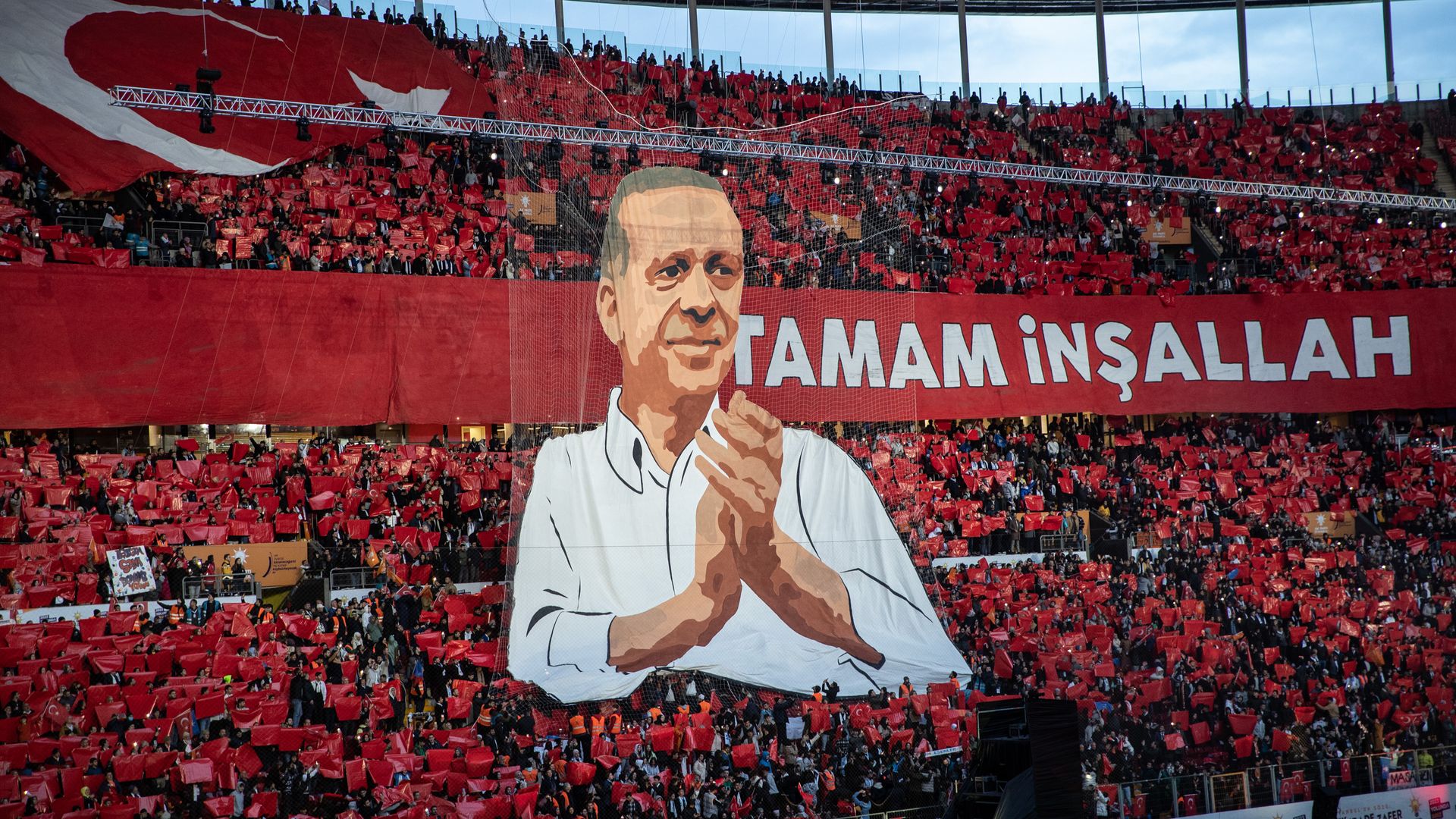 | | | Supporters of the AKP display a giant poster of President Erdoğan during a rally on Nov. 27 in Istanbul. Photo: Burak Kara/Getty Images | | | | The new year will bring a number of high-stakes elections, with high inflation and a shaky global economic outlook potentially making life difficult for incumbent leaders. - Here's a look at five key races in Nigeria, Turkey, Pakistan, Thailand and Argentina.
1. Nigeria will elect the successor to President Muhammadu Buhari in February. - The big picture: High unemployment, corruption and insecurity — particularly the Boko Haram insurgency in the northeast — are key concerns in Africa's most populous country. Perceptions that the term-limited Buhari failed to deal with those problems leave a big opening for the opposition.
- The main opposition party nominated Atiku Abubakar, a former vice president who is making his sixth run for the top job. He claimed the 2019 election was "rigged" after losing to Buhari.
- Abubakar's running mate in that race, Peter Obi — a wealthy businessman with a big social media following among younger voters — is now making a strong third-party challenge. A poll commissioned by Bloomberg showed Obi with a big early lead.
- What to watch: Recent attacks on election commission offices around Nigeria have deepened concerns that intimidation and violence could affect the vote.
2. Turkish President Recep Tayyip Erdoğan will seek to extend his two decades in power in June, but record-high inflation and slumping approval ratings suggest that won't be easy. - Driving the news: A court last week sentenced one of Erdoğan's top potential challengers, Istanbul Mayor Ekrem İmamoğlu, to two years, seven months in prison in a libel case that was widely seen as politically motivated.
- İmamoğlu is free pending an appeal, and it's not yet clear if he'll be banned from running. He defeated a candidate from Erdoğan's AKP party twice in 2019 to become mayor, after the AKP challenged the initial result.
- State of play: Polls show a tight race between Erdoğan and the opposition alliance, which has yet to nominate its candidate.
3. Pakistan is due to hold elections by October, but former Prime Minister Imran Khan — who was ousted by parliament in April and survived an apparent assassination attempt last month — is pressuring the government to hold them sooner. - Between the lines: Khan's ouster came amid a rift with the army, which wields significant influence over Pakistani politics. Given his continual clashes with the military, judiciary and electoral authority, it's possible he'll be ruled ineligible to run.
- Flashback: Nawaz Sharif was removed as prime minister and barred from holding office in 2017 over corruption allegations, which helped Khan rise to power. Now it's Khan fending off corruption charges as he challenges the current prime minister and Nawaz's brother, Shehbaz Sharif.
4. Thailand's highly unpopular Prime Minister Prayut Chan-o-cha has hinted that he'll run again in the upcoming general election, to be held in May. - Polls put the opposition far ahead, but Prayut oversaw constitutional reforms that give army-backed parties a built-in advantage after taking power in a 2014 coup.
- Why it matters: The elections could be a step toward restoring democracy, or toward further institutionalizing quasi-military rule.
5. President Alberto Fernández of Argentina is also hoping to defy very low approval ratings, and very high inflation, to win another term in October. - Looming in the background are two former presidents. Now vice president, veteran leftist Cristina Fernández de Kirchner — who was recently convicted of corruption (she's appealing) but retains a loyal following — says she won't run.
- Conservative Mauricio Macri is considering a run to avenge his loss in 2019, but that would risk dividing the opposition, which currently has a sizable polling lead, the FT notes.
|     | | | | | | 2. China braces for big COVID wave |  | | | On the move in Beijing. Photo: Bloomberg via Getty Images | | | | COVID-19 cases appear to be surging in cities across China, with funeral homes overwhelmed and some factories closed for lack of health workers, Reuters reports. Driving the news: Schools in cities including Shanghai are moving online, but restrictions like compulsory testing and lockdowns of workplaces and apartment buildings have not been reimposed. - Officials and state media shifted almost overnight from defending "zero COVID" as the only prudent course, to praising the reversal and stressing that Omicron cases tend to be mild.
- "There are many people who have been living under the official propaganda for a long time, so after being released they feel at a loss about what to do," a psychological counselor in Chongqing told the NY Times. "There are even some who hope that the government will restore controls."
The big picture: While rising case counts and rare protests made Covid Zero increasingly unsustainable, it's hard to overstate the potential impact of the sudden policy shift. - Models suggest China is likely to face up to 1 million deaths in the coming months, Smriti Mallapaty writes in Nature, though factors like the uptake of booster shots and the potential reimposition of government controls could shift the trajectory.
What to watch: The government is focusing on getting the elderly vaccinated. One-third of people over age 80 are not fully vaccinated, and just 40% are up to date with booster shots. |     | | | | | | 3. Tunisians (don't) go to the polls | 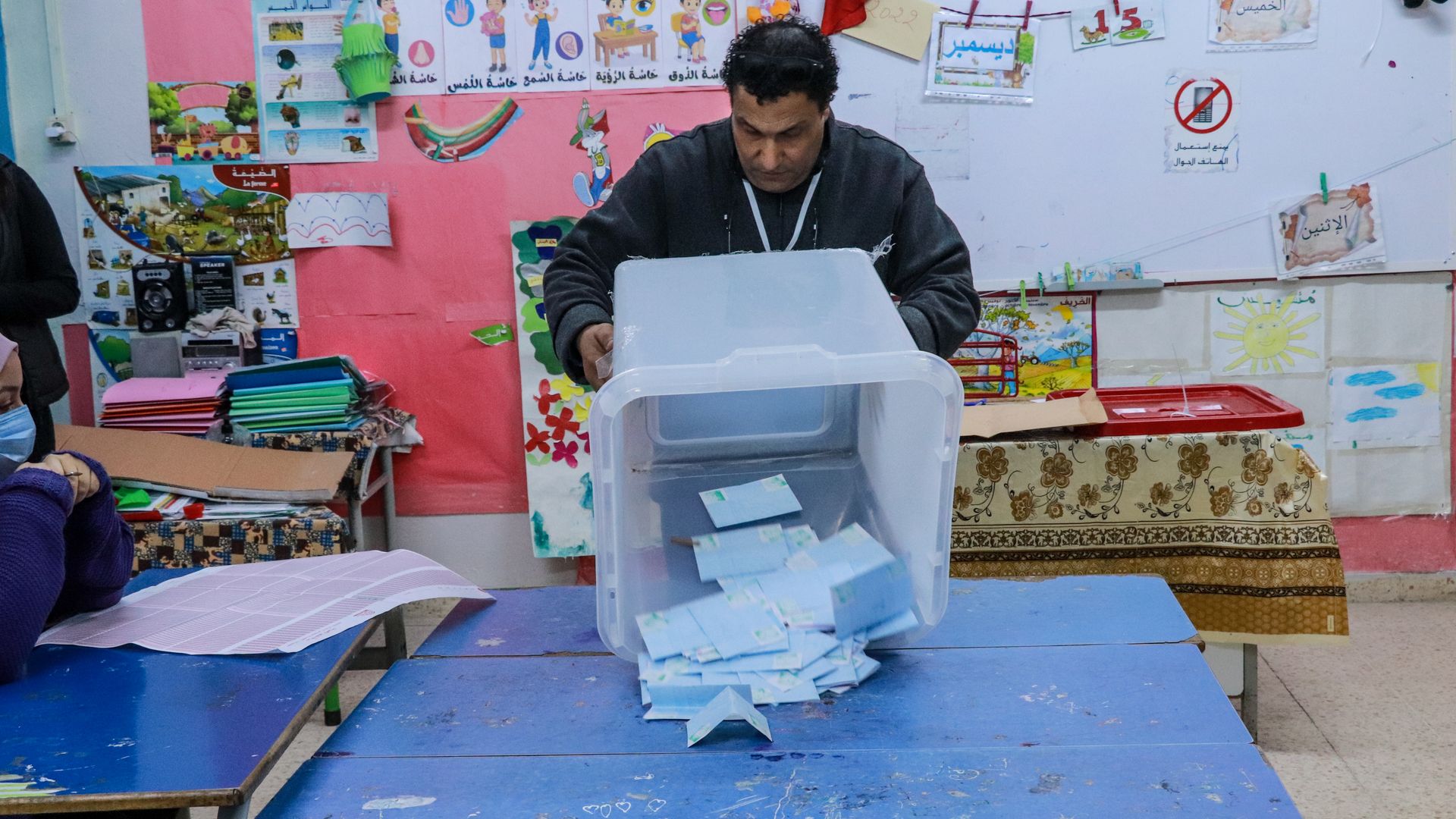 | | | Election day in Tunis. "Shouldn't there be more of these?" Photo: Hasan Mrad/DeFodi Images via Getty Images | | | | Turnout for Saturday's parliamentary elections in Tunisia was a mere 8.8%, a major blow to President Kais Saied's legitimacy. The big picture: The former law professor has been ruling by decree since he suspended parliament in July 2021, and he shifted power to the presidency through constitutional reforms which passed overwhelmingly in a referendum last summer, albeit on 30% turnout. - Opposition parties boycotted Saturday's vote, and have accused Saied of trampling over Tunisia's hard-won democracy. Amazingly, only around 5,000 voters under age 25 bothered to turn up, according to independent news outlet Meshkal, citing official data.
- "We are no longer talking about a democratic path. As a young adult, out of fear of imprisonment, I started avoiding expressing my thoughts and being as active as I used to," one young teacher who boycotted the vote told Meshkal.
- What's next: There will now be runoffs in the vast majority of districts where no candidate secured enough support to win outright. Saied rejected criticism of the low turnout as akin to "announcing a final result of a match at the end of the first half."
More global headlines - South African President Cyril Ramaphosa narrowly held on to be re-elected as leader of the African National Congress and the party's likely 2024 presidential candidate despite the still-simmering "Farmgate" scandal.
- The U.K.'s highest court ruled that a plan to send asylum-seekers to Rwanda is legal. It will still be very difficult and expensive to execute, as the cases of each individual will have to be "properly considered" before they're deported.
- Renowned Iranian actress Taraneh Alidoosti was arrested after expressing solidarity with the protests.
|     | | | | | | A message from Babbel | | Polish up your Polish — or 13 other languages | | |  | | | | Not only can you learn to say "dziękuję ci" ("thank you" in Polish!) with Babbel, but it also helps get your pronunciation right from the start. A language learning platform developed by 150 linguists, Babbel has lessons, exercises, videos and more. Speak a new language in as little as three weeks. | | | | | | Bonus: Where in the world? | 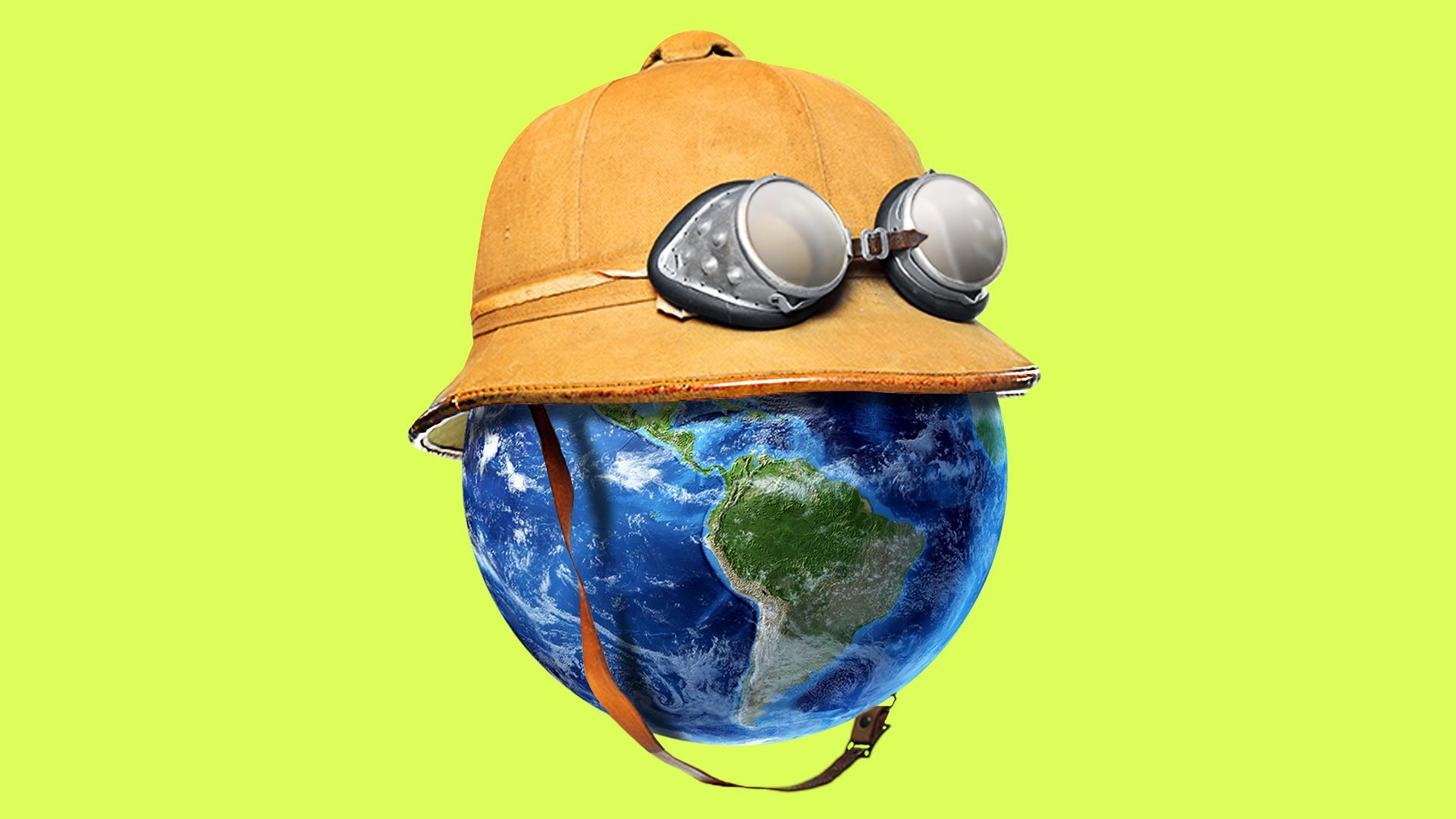 | | | Illustration: Natalie Peeples/Axios | | | | Can you name the city, country or venue where the following events will happen in 2023? - Jan.: Inauguration day in ____, with a former president returning for another go-around.
- Jan.: New Year's celebrations in ___ — and elsewhere around the world, on a smaller scale — will kick off the year of the rabbit.
- May: King Charles III will be inaugurated at ___ in London.
- July: Festivities to mark 50 years of independence from the U.K. will be held in Nassau, capital of ___.
- July/Aug.: ____ and ___ will jointly hold the women's soccer World Cup.
- Sept..: King Carl XVI Gustaf of ___ will mark 50 years on the throne.
- Oct.: The famous opera house in ___ will mark its 50th anniversary.
- TBD: ____ will become the world's most populous country.
Scroll to the bottom for answers. |     | | | | | | 4. "They will have another go at Kyiv" | 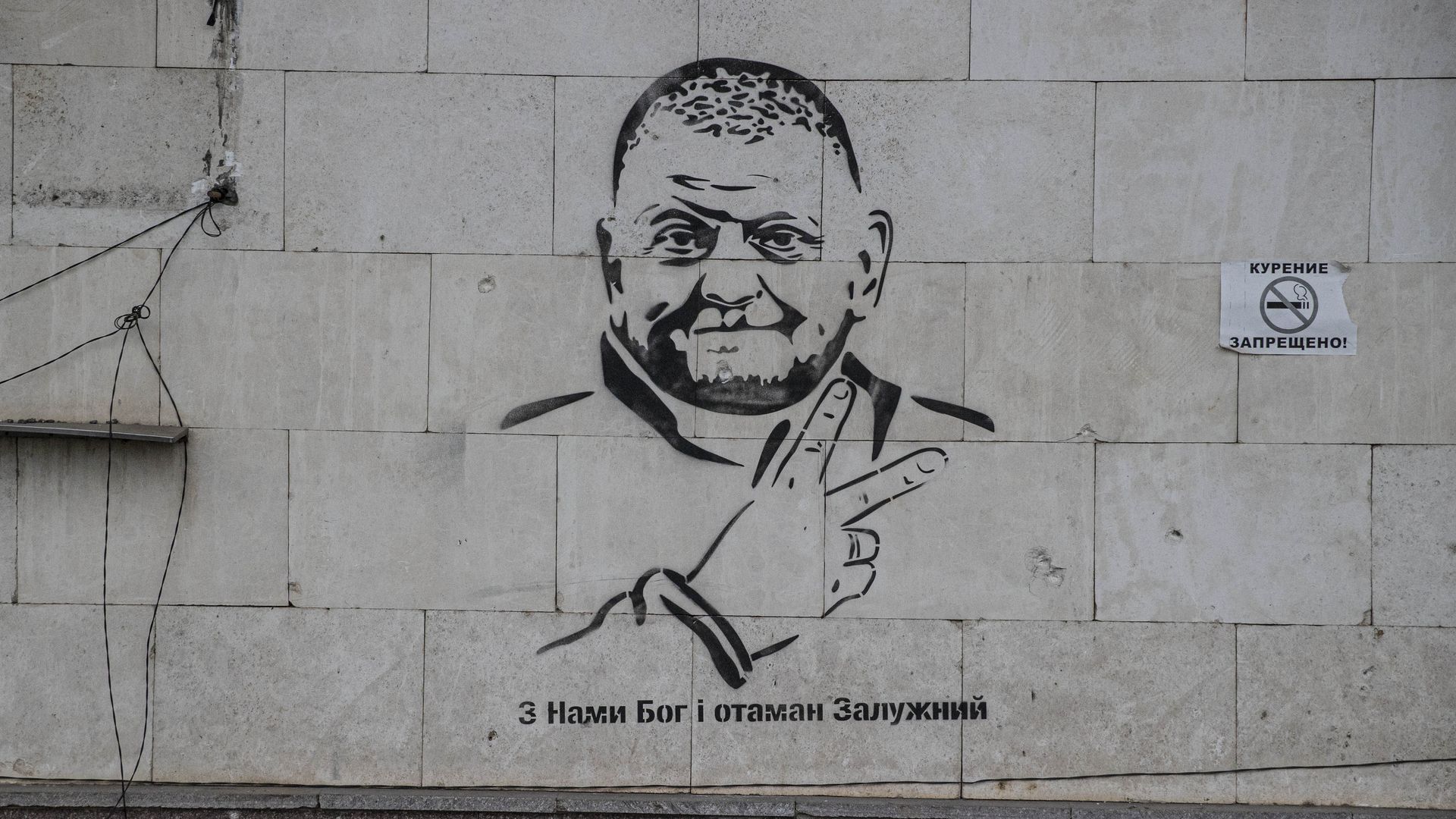 | | | A mural of Gen. Valery Zaluzhny in Kherson, Ukraine. Photo: Metin Aktas/Anadolu Agency via Getty Images | | | | Ukraine's forces have three major challenges this winter, Gen. Valery Zaluzhny tells the Economist. 1. Hold the line. - Russian forces are conducting scattered attacks so as "not to let us regroup and strike," the Ukrainian commander says, and to buy time for Moscow to bring more men and materiel into the fight.
- "[I]t is 10 to 15 times harder to liberate it than not to surrender it. So our task now is to hold on," he says.
2. Prepare for larger-scale fighting starting around February by bringing in more reserve troops and Western arms. - "May the soldiers in the trenches forgive me, it's more important to focus on the accumulation of resources right now for the more protracted and heavier battles that may begin next year," he says.
- "I know that I can beat this enemy. But I need resources. I need 300 tanks, 600-700 [infantry fighting vehicles], 500 Howitzers. Then, I think it is completely realistic to get to the lines of February 23rd," he says.
- Yes, but: "Russian mobilization has worked," he says. "The Russians are preparing some 200,000 fresh troops. I have no doubt they will have another go at Kyiv."
3. Improve air and missile defense. - If the power grid is destroyed, "that is when soldiers' wives and children start freezing. And such a scenario is possible. What kind of mood the fighters will be in, can you imagine?"
In related news...- Vladimir Putin visited Belarus today, possibly to seek military support for the invasion.
- Flashback: Russia launched its offensive on Kyiv in February from across the border in Belarus.
- Meanwhile, Russia attacked civilian infrastructure in Kyiv and other cities overnight with so-called kamikaze drones — the first time Moscow has mounted such a major drone attack under cover of darkness, per WaPo.
Read the interview highlights. |     | | | | | | 5. Landmark biodiversity treaty | 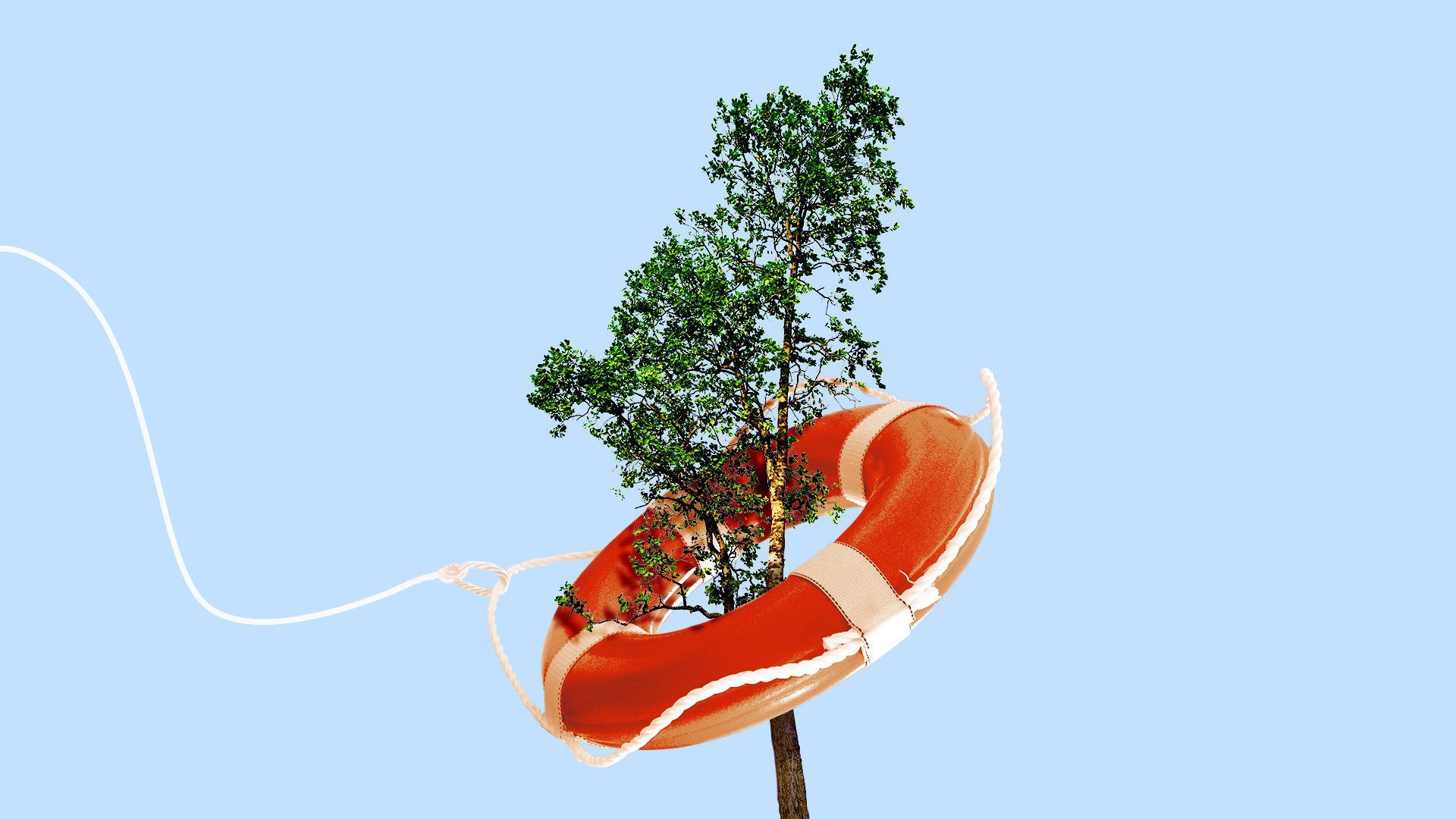 | | | Illustration: Annelise Capossela/Axios | | | | A UN summit yielded a historic global deal in Montreal on conservation and biodiversity that aims to protect huge swaths of lands and oceans while boosting financing to help meet the targets, Axios' Ben Geman writes. - The big picture: The deal is aimed at halting and reversing the ongoing extinction crisis. It is the most far-reaching agreement addressing biodiversity that the world has signed on to.
- Yes, but: The targets are non-binding, and there's no guarantee they'll be transformed into tangible steps.
|     | | | | | | 6. What the world was watching |  | | | The scene in Buenos Aires. Photo: Diego Radames/Anadolu Agency via Getty Images | | | | Other than perhaps sleeping, how often are 1 billion people doing the same thing at the same time? The unparalleled global audience is part of the magic of any World Cup final. - This time, the game itself was truly magical, along with the storylines — the greatest player of his generation (Lionel Messi, 35) securing his long-elusive crowning achievement, despite a hat trick from the greatest player of his generation (Kylian Mbappé, 23).
- The streets of Buenos Aires have been the stage for an open-air party that seems unlikely to wind down any time soon. They might otherwise have been filled with protests over inflation and corruption, as Teo Armus notes in WaPo.
- For now, joy. In one moving moment, jubilant fans serenaded a blind man on his balcony.
|     | | | | | | 7. Stories we're watching | 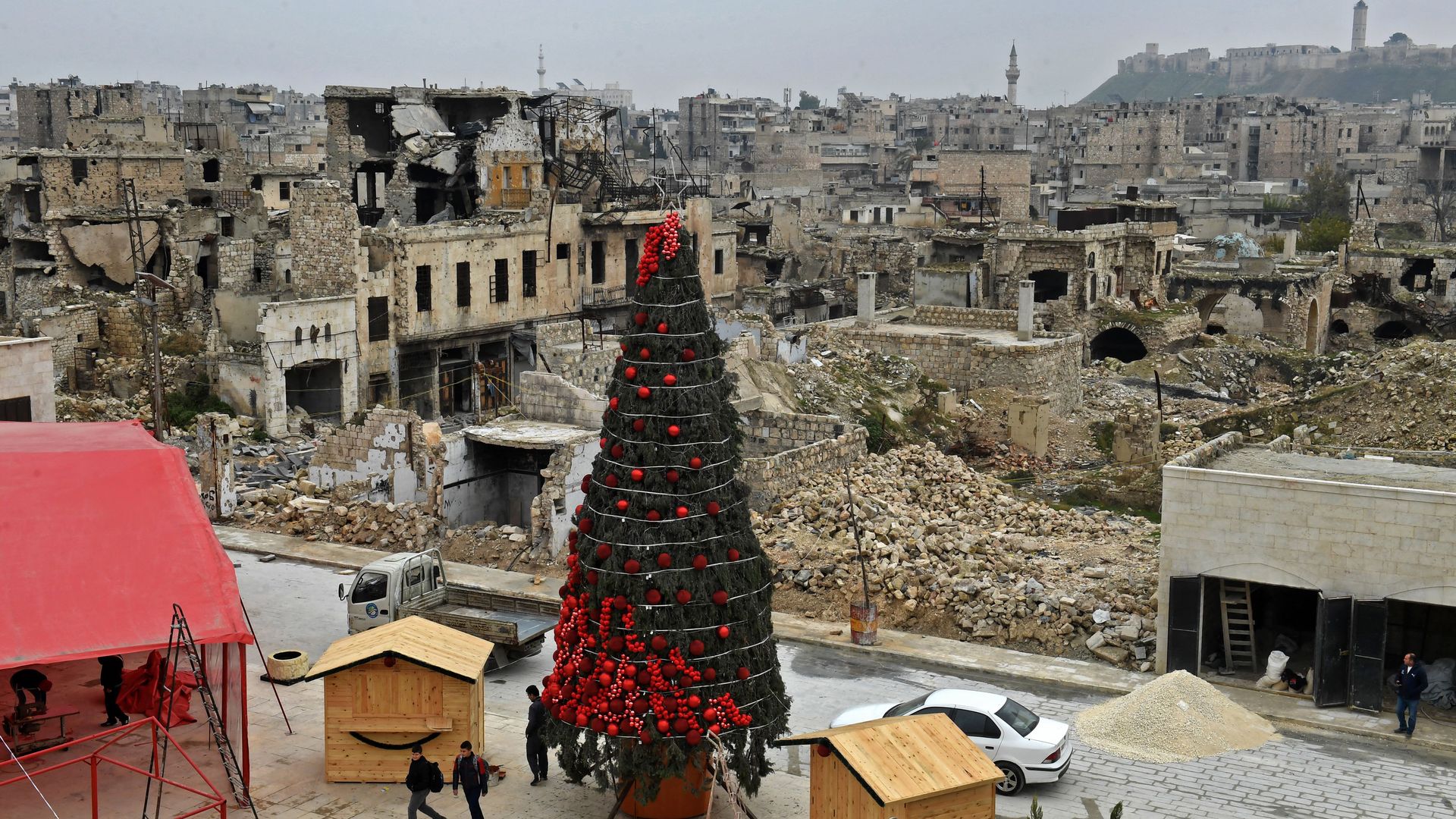 | | | A Christmas tree in Aleppo, Syria. Photo: AFP via Getty Images | | | - Peru protests: New pres. pushes early elections; Ex-pres. Castillo gets 18-month detention; Tourists stranded at Machu Picchu
- Biden wants Cindy McCain to lead World Food Program
- U.S. launches "China House" to coordinate policy
- Former military leaders call on Congress to help Afghan refugees
- Zelensky says FIFA blocked peace message
- China property bonds soar on bailout trade
- Huge Berlin aquarium collapses with 1,500 fish inside
Quoted: "It is true nobody alive today bears any personal guilt for slavery. But the Dutch state bears responsibility for the immense suffering of those who were enslaved, and their descendants. Today, on behalf of the Dutch government, I apologize for the past actions of the Dutch state." |     | | | | | | A message from Babbel | | Say "ja" to learning a new language | | |  | | | | Babbel has what you need to learn how to hold real-world conversations in Dutch, Spanish and more. Learn through: - Expert-curated lessons.
- Speech technology that improves your accent.
- Context and cultural tips.
- Live online classes or videos.
Speak a new language in as little as three weeks. | | | | Answers: 1. Brazil; 2. China; 3. Westminster Abbey; 4. The Bahamas; 5. Australia and New Zealand; 6. Sweden; 7. Sydney; 8. India. Key: - Jan.: Inauguration day in ____, with a former president returning for another go-around.
- Jan.: New Years celebrations in ___ — and elsewhere around the world, on a smaller scale — will kick off the year of the rabbit.
- May: King Charles III will be inaugurated at ___ in London.
- July: Festivities to mark 50 years of independence from the U.K. will be held in Nassau, capital of ___.
- July/Aug.: ____ and ___ will jointly hold the women's soccer World Cup.
- Sept..: King Carl XVI Gustaf of ___ will mark 50 years on the throne.
- Oct.: The famous opera house in ___ will mark its 50th anniversary.
- TBD: ____ will become the world's most populous country.
|  | | Are you a fan of this email format? Your essential communications — to staff, clients and other stakeholders — can have the same style. Axios HQ, a powerful platform, will help you do it. | | | | | | Axios thanks our partners for supporting our newsletters. If you're interested in advertising, learn more here.
Sponsorship has no influence on editorial content. Axios, 3100 Clarendon Blvd, Arlington VA 22201 | | | You received this email because you signed up for newsletters from Axios.
Change your preferences or unsubscribe here. | | | Was this email forwarded to you?
Sign up now to get Axios in your inbox. | | | | Follow Axios on social media:    | | | | | |












No comments:
Post a Comment